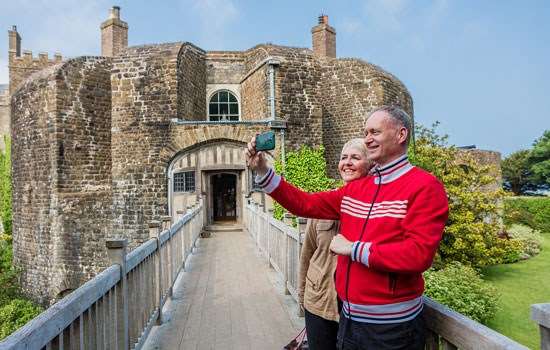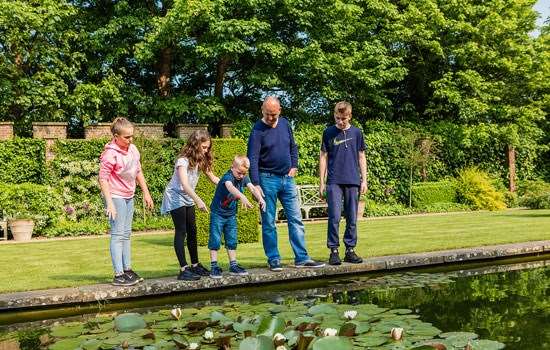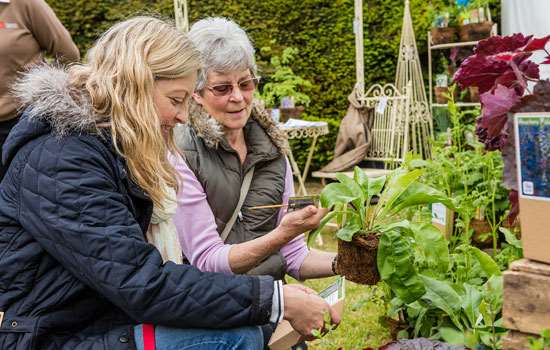Walmer Castle in Spring
Spring often comes early at Walmer Castle. Winter aconites Eranthus hymalis provide splashes of yellow in the Queen Mother's Garden, and hellebores open in the Woodland Garden. In the Paddock swathes of daffodils entice you to explore the garden further, before being replaced later in the year by bluebells. From the first signs of spring, daffodils and snowdrops emerge all across the gardens, the result of large scale plantings by the castle's gardeners in recent seasons.
At the top end of the Oval Lawn a well established group of Fritillaria meleagris, the snake's head fritillary, is steadily increasing through self-seeding year by year. With the warmer weather, cherry blossom in the Paddock and apple blossom in the Orchard and Kitchen Garden create a magnificent sight whilst cowslips and oxslips proliferate in the castle meadow.
The Kitchen Garden is a highlight at Walmer Castle in any season but the bright new shoots from the spring sowing of seeds, and the planting out of young plants, whet the appetite for the crops to come.
By late spring the herbaceous plants of the Broadwalk will be showing off their vibrant fresh foliage, ready to provide colour and interest throughout the summer months and into the autumn.
Throughout the year, events at Walmer offer many different opportunities to enjoy the gardens.
Discover Events at Walmer
Walmer Castle in Summer
In the meadow, wild flowers including pyramid orchids (Anacamptis pyramidalis), common spotted orchids and blue Scabiosa can be seen nestled in the long grass. The trees surrounding the Paddock provide a striking dark green backdrop to the rest of the garden.
During summer, the Kitchen Garden is in full production with a spectacular offering of vegetables and flowers. A permanent display of houseplants, cacti and succulents can also be admired in the Glasshouse.
Even the castle itself is taken over by the riot of colour spreading across the gardens. Large colonies of Australian daisy, Erigeron Karvinskianus, begin to peek out from nooks and crannies across the walls and bastions, brightening the scene still further.
The double border of the Broadwalk is superb throughout the summer with drifts of plants such as bear's breeches (Acanthus spinosus), spiked blue Echinops ritro, the tall yellow Cephalaria gigantea, goldenrod, (Solidago), and dark pink Bistorta amplexicaulis, all set against the dark green of the 'cloud' yew hedge.
The cloud hedge also provides a stunning backdrop to the Oval Lawn with its stately commemorative trees. Many of the specimen trees have an important pedigree as they were planted by past Lord Wardens, including William Pitt and Queen Elizabeth the Queen Mother.
The moat, shaded by the high walls of the castle is filled with large jungle plants with lush foliage, growing well in this microclimate. Magnolia grandiflora, planted in the 1860s, has large, scented flowers from June until September.
The mix of, cool shaded lawns, leafy woodland canopies and coastal breezes make Walmer a comfortable garden to explore in the heat of summer. Children can stretch their legs on the oval lawn, spot dragonflies flitting above the Queen Mother's Garden pond, or challenge each other in giant garden games. Grown-ups have plenty of opportunities to enjoy the shade nearby, take a stroll through William Pitt's Pleasure Grounds, or perhaps admire the view of the gardens through the Keyhole.
With longer evenings and plentiful outdoor space, in summer the gardens are also a popular venue for performances by local musicians.
CHECK FOR UPCOMING PERFORMANCES AT WALMERWalmer Castle in Autumn
As summer turns to autumn the Kitchen Garden at Walmer Castle is heavily laden with fruit and vegetables. Pumpkins swollen from summer growth are harvested in time for Halloween. Apples and pears ripen in the orchard and along trained boughs, showing splashes of colour against the green foliage.
In the Paddock, the meadow has been cut and cyclamen are starting to flower under the trees here and in the Woodland.
Colour is provided in the Queen Mother's Garden by late flowering perennials. As the leaves of the Virginia creepers (Parthenocissus) change colour, they turn the walls of the castle flame red.
Walmer Castle in Winter
With just a few remaining crops in the Kitchen Garden, the hard work of preparing the ground again for the new season is well underway.
With perennials in the Broadwalk cut back, the gardeners mulch the borders and cut the cloud hedge. Plant supports are made with hazel branches collected from the Woodland.
Colour and interest in the garden are provided by snowdrops, winter aconite and Helleborus in the Woodland and during mild winters with an early showing of the 'summer snowflake' Leucojum aestivum in the Queen Mother's Garden.
In December 2024 our collection of Greatorex Double Snowdrops has been awarded National Plant Collection Status by Plant Heritage. Some of the collection has been planted out at the top of the Orchard, others can be found in a pot display in the Kitchen Garden amongst a colleciton of over 80 other rare snowdrop varieties.

GET INVOLVED
Caring for Walmer's historic gardens is a team of knowledgeable gardeners and volunteers. Passion for horticulture and historical knowledge of the development of Walmer's gardens by successive Lords Warden allows our team to conserve these historic pleasure grounds for future generations to enjoy.
If you would like to share your passion for gardening, or are looking to develop horticultural skills and experience, the re-discovering Walmer's pleasure grounds project has afforded many new opportunities to get involved.
BROWSE VOLUNTEERING OPPORTUNITIESExplore Walmer's Gardens
-

Queen Mother's Garden
Enjoy the Queen Mother's Garden, gifted to Queen Elizabeth the Queen Mother for her 95th birthday.
-

The Broadwalk
See one of the glories of Walmer; the magnificent Broadwalk.
-

The Kitchen Garden
Explore the fruit trees, vegetable beds and glasshouses of Walmer's Kitchen Garden.
-

Re-Discovering Walmer's Pleasure Grounds
Find out more about the £2.3m project to revive and reunite parts of Walmer's historic gardens.



